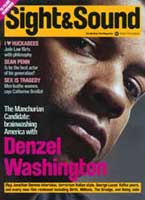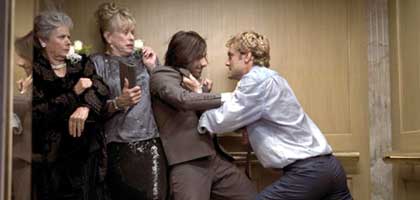
Being and nothingness
Film of the Month: I Heart Huckabees

David O. Russell's all-star I Heart Huckabees mines corporate culture and existential neuroses for screwball laughs. Ben Walters is amused.
In David O. Russell's second film Flirting with Disaster (1996) Téa Leoni's Tina - the adoption researcher mismanaging entomologist Mel Coplin's reunion with his birth parents - observes that: "No matter where we are in our lives, we can't help but feel that there's something missing; that there's something out there that's going to make us feel complete, give us a sense of belonging, connectedness if you will."
"This woman," Mel's adoptive mother replies, "strikes me as being very dangerous."
Identity, belonging and their attendant neuroses have been at the heart of all Russell's pictures, but his latest explicitly brings such concerns to the fore: I Heart Huckabees is surely the first Fox film marketed with the tagline "An Existential Comedy". Revisiting and developing these themes through a formal playfulness and self-referential narrative reminiscent of a Charlie Kaufman screenplay, Huckabees pays equal attention to the corresponding anxieties - so tartly expressed by Mrs Coplin above - about disrupting the apple-cart of the unexamined life.
Following a coincidental triple encounter with a lanky Sudanese refugee, environmental activist Albert Markovski (Jason Schwartzman) recruits "existential detectives" Vivian and Bernard Jaffe (Lily Tomlin and Dustin Hoffman) to unravel the fluke. The precise ins and outs of what existential detective work involves are kept deliberately vague: like two philosophy professors squatting in a sleek corporate law firm, the bookish Jaffes have a select band of clients who seem to learn of their services through the discreet business cards they leave in public places.
The investigation of Albert's case turns out to require surveillance of every aspect of his life, from bathroom procedures to his vexed professional relationship with Brad Stand (Jude Law), a slick young exec with retail chain Huckabees who is exploiting Albert's environmental pressure group Open Spaces Coalition to improve the store's image (and advance up the corporate ladder). To unsettle Albert even further, Brad submits to investigation by the Jaffes too. It's a process - as explained by Bernard - that encourages its subjects to dismantle their personality and accept that "everything is connected and everything matters". Also affected by their probing is Brad's trophy girlfriend and Huckabees spokesmodel Dawn (Naomi Watts). Meanwhile another of their clients - disillusioned firefighter Tommy (Mark Wahlberg) - is drawn to the rival teachings of French nihilist Caterine Vauban (Isabelle Huppert).
Like Mel in Flirting with Disaster and Ray in Russell's first feature Spanking the Monkey (1994), Albert is an intense, ambitious young intellectual (wearing a rumpled suit, he cycles from location to location carrying notebooks of his self-penned poetry) stymied by family circumstance. Incest was the strongest element in Spanking's constellation of domestic dysfunction, while Flirting with Disaster made genetics the root of an existential crisis. In Huckabees Albert's parents are a classically neurotic, bickering Jewish couple, and in a scene typical of Russell's screwball approach to psychoanalytical trauma Vauban blames Albert's insecurities on his mother's distance; that Schwartzman's own mother Talia Shire plays Albert's mom adds an extra frisson to her questionable defence ("I gave my life to this selfish bastard").
Leaving the inadequacies of their families behind, Huckabees' characters attempt to construct an identity by other means: Albert has his nature-loving poetry ("you rock, rock") and a penchant for planting stills of himself in photographic archives; Brad specialises in self-aggrandising anecdote (anodyne tales of celebrities who have endorsed the Huckabees brand). Work is central to all four leads' sense of self, and professional crisis the defining factor in their breakdowns: it is Albert's ejection from his coalition that tips him into despair, while the careerist Brad throws up when asked to deliver his trademark anecdote - an excruciatingly dull titbit about country singer Shania Twain - to the Huckabees board. To the store's consternation, Dawn shifts from perky spokesmodel to dowdy "Amish bag lady" while Tommy turns his hose on his crewmates and bemoans their truck's gasoline consumption ("I'm not a hero - but we'd all be heroes if we stopped using petroleum").
As with Russell's other films, Huckabees moves its audience from initial bafflement to a broader apprehension of a situation rife with complexity. The Gulf War satire Three Kings (1999) fits this mould as much as Russell's family comedies: that film's opening confusion ("Are we shooting? I don't know the answer, that's what I'm trying to find out") is echoed in Albert's obscene interior monologue which overlays the opening birdsong ("Motherfucking cocksucker motherfucking shit-fucker. What am I doing? I don't know what I'm supposed to do any more. Fucker. Fuck! Shit!"). Russell's process involves unpicking his characters' motivations on their own terms, so even as obnoxious a figure as Brad can be sympathetically interrogated without our being asked to like him. (Dawn's transformation, however, is a little less convincing.)
Most impressively realised is Mark Wahlberg's Tommy, whose affecting combination of sincere concern and infantile aggression often appears in the same scene: moments after explaining sweatshops to his daughter with a pained frown he's decking someone who refers to Bernard as his therapist. In a stand-out set-piece dinner-table showdown with Sudanese refugee Stephen's adoptive family Tommy rapidly progresses from debating geopolitics to lobbing bread rolls.
The Jaffes too are rather sweet: Hoffman's Bernard is sagely rumpled with scarecrow hair; Tomlin's Vivian is slickly dressed in black but a little fuzzy round the edges. Their scatty warmth contrasts nicely with the icy nihilism of Huppert's Vauban: where the Jaffes' card promises "crisis investigation and resolution", Vauban's offers "cruelty, manipulation, meaninglessness"; where she is unobtrusively feline in her surveillance techniques, Vivian is ridiculously blatant.
Yet in other ways Vauban stands for disorder while her rivals aim for clarity. The Jaffes' visual motif is a field of interlocking rectangles, first glimpsed on a blackboard then echoed in the digital segmentation of the screen into the interconnected blocks of which, Bernard maintains, reality is composed. Vauban, on the other hand, embraces pain and mess: the bruising woodland quickie she shares with Albert is surely the dirtiest sex scene of recent years, as, having smeared mud across one another's bodies, they couple with her lying sprawled face down across a log, dangling stilettos quivering in time to his thrusts. There's a transgressive thrill in watching Huppert, an actress best known for bourgeois refinement, rolling in a muddy puddle - or in hearing Tippi Hedren use the F-word - that chimes with Huckabees' theme of the redefinition of character (echoed by the strategy of casting archetypal supermom Mary Tyler Moore as the squawking Mrs Coplin in Flirting with Disaster).
Bernard's notion of free-floating conceptual segments becomes part of a formal approach that builds on Three Kings' glimpses of imagined scenes. Most obvious here are the images of Albert's thought processes as, zipped into a body-bag to reduce sensory stimuli, his attempts to clear his mind give way to violent and disturbing fantasies. Relaxation techniques involving characters sitting in trees prove similarly unconstructive, while the vision of a Madonna-like Brad as the infant Albert's lactating mother is hard to dislodge. The production design by K.K. Barrett (who worked on Being John Malkovich, Human Nature and Adaptation.) includes an Escher-like maze of corridors and quirky office spaces that would suit a Kaufman screenplay - a resemblance strengthened by such wacky touches as a Spanish crone brought in to chant to the Jaffes' clients about poverty as "a kind of spiritual petit-four" or a cantaloupe left on a desk for no reason.
Russell shares Kaufman's attention to the banal ("If we see you floss or masturbate," Vivian tells Albert, "that might be the key to your entire identity"), and like Adaptation. this is a story that comments on its own unfolding. Jon Brion's score - an eerie synth fairground suite in waltz time - adds to the atmosphere of self-conscious reflexivity, as do jokes about the impenetrability of the central conceit: "You can't deal with my infinite nature, can you?" Dawn bleats. "That is so unfair!" Brad gasps. "Wait, what does that even mean?"
That Huckabees never answers this question is perhaps unsurprising: as with Bernard's free-floating segments, which crash to the floor on interruption, the film's pleasures are somewhat transitory, its mild cartoonism never challenged by the ethical jolts of Three Kings. Despite references to "the big September thing" and Vauban's assertion to Albert that where the Sudanese Stephen "was orphaned by civil war, you were orphaned by indifference", the links between the characters' crises and broader socio-political concerns are unclear. Meanwhile the investigators' rival philosophies can't presume to offer revelatory insights into being and nothingness. That the characters are more contented among the detritus of the apple cart might be enough - as Tomlin's character Mary blithely advises in Flirting With Disaster : "Identity is nothing but a construct. You mustn't fixate on it."
